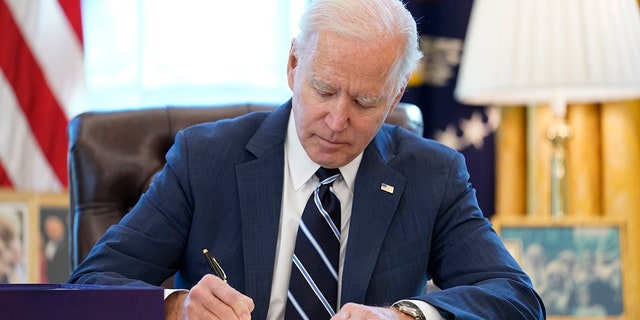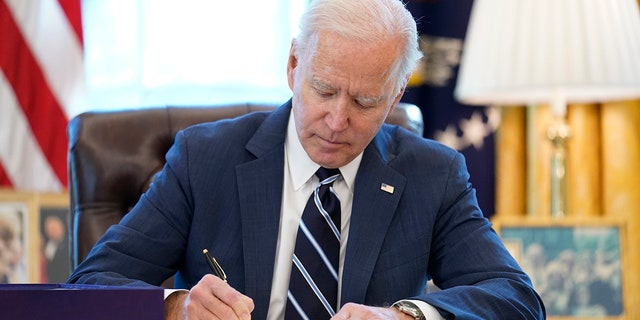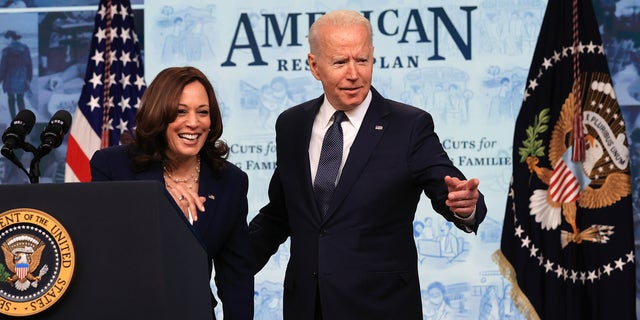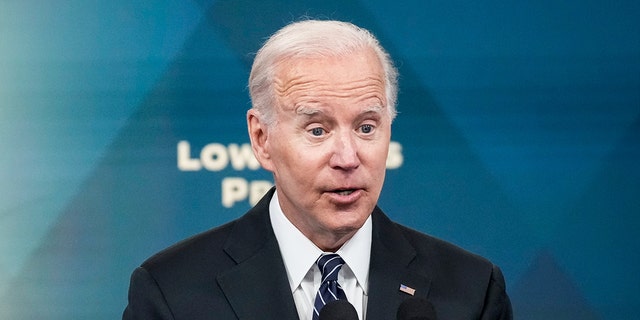
NEWYou can now listen to Fox News articles!
FIRST ON FOX: Hundreds of thousands of taxpayer dollars from President Biden’s $1.9 trillion COVID-19 relief package went towards “under/unemployed oral historians” and their research related to studies in anti-racism and Indigenous and “Latinx” histories.
The American Rescue Plan (ARP) Act, which Democrats passed in March 2021 without any Republican support, was billed by the Democratic Party as an economic necessity for getting the country through the COVID-19 pandemic. The National Endowment for the Humanities (NEH), which received $135 million from the plan, announced last October that it had allocated $87.8 million in ARP funds to “nearly 300 cultural and educational institutions to help them recover from the economic impact of the pandemic, retain and rehire workers, and reopen sites, facilities, and programs.”

President Joe Biden signs the American Rescue Plan, a coronavirus relief package, in the Oval Office of the White House, Thursday, March 11, 2021, in Washington. (AP Photo/Andrew Harnik)
However, many of the institutions were awarded grants for projects that had virtually little to do with addressing recovery efforts from the pandemic.
The Oral History Association, for instance, received $825,000 in ARP funds for a grant-making project titled, “Diversifying Oral History Practice: A Fellowship Program for Under/Unemployed Oral Historians,” which provided eleven year-long fellowships of $60,000 each for oral historians “from communities which have been historically marginalized in the field,” such as “Indigenous peoples, people of color, people with disabilities, and working class people.”
Recipients of the $60,000 grants included Elizabeth “Beth” Castle, a “Shawnee-ancestored anti-racist educator,” to create “A Collaborative Oral History of the Fight Against Mineral and Uranium Mining in the Black Hills, the Origins of the Global Indigenous Movement, and the Ongoing Struggle to Protect the People who Protect Mother Earth.”
EPA USED COVID-19 RELIEF FUNDS FOR GRANTS PROMOTING ‘GREEN INFRASTRUCTURE,’ ‘ENVIRONMENTAL JUSTICE’
Another $60,000 grant recipient included oral historian Virginia Espino for her project exploring the “intimate histories of working class Latinx, Afro-Latinx and Indigenous people in Los Angeles with the goal of recovering and recording the experiences and rebellious ideas that inform the ordinary lives of women who are invisibilized when not stereotyped.”
Colette Denali Montoya-Sloan, a queer, Indigenous librarian/archivist, received a $60,000 grant to develop an oral history of the “collective emotional, intellectual, and spiritual experience of creating” the new Visitor Contact Station at the Katahdin Woods and Waters National Monument in northern Maine.

Before an audience of nine families that are benefiting from the new Child Tax Credit, U.S. President Joe Biden and Vice President Kamala Harris deliver remarks on the day tens of millions of parents will get their first monthly payments in the South Court Auditorium in the Eisenhower Executive Office Building on July 15, 2021 in Washington, DC. (Photo by Chip Somodevilla/Getty Images)
The Oral History Association was previously awarded $50,000 in ARP funds to maintain staff positions during the COVID-19 pandemic and to post oral histories on the web. It is just one of dozens of cultural and educational institutions that were awarded millions in ARP funds by the NEH for programs pushing social and climate justice.
For instance, the NEH awarded $50,000 in ARP funds for a nonprofit organization in the Northern Mariana Islands called 500 Sails for “reopening programs that teach Indigenous canoe-building and explore pre-colonial sea life.”
The NEH also awarded $471,905 in ARP funds to the Carnegie Institute in Pittsburgh for the “ongoing development” of an existing exhibit on Ancient Egypt, and the Science History Institute in Philadelphia was awarded $359,097 by the NEH to create a “multiplatform project exploring the historical roots and persistent legacies of racism in American science and medicine.”

U.S. President Joe Biden speaks about gas prices in the South Court Auditorium at the White House campus on June 22, 2022 in Washington, DC. (Photo by Drew Angerer/Getty Images)
Just before signing the ARP in March 2021, Biden described every allocation of funds in the legislation as essential.
“We need Congress to pass my American Rescue Plan that deals with the immediate crisis — the urgency,” the president said at the time. “Now, critics say my plan is too big, that it costs $1.9 trillion. So that’s too much. Well, let me ask them: What would they have me cut? What would they have me leave out?”
Now, the American Rescue Plan is facing intensifying scrutiny for its effect on the U.S. economy. Inflation hit 8.6% in May, and some economists, including former Obama administration economic advisers, have blamed the $1.9 COVID-19 relief package for overheating the economy.

A gas pump displays the price of fuel at a gas station in McLean, Virginia, June 10, 2022. ((Photo by SAUL LOEB/AFP via Getty Images))
CLICK HERE TO GET THE FOX NEWS APP
Jay Greene, a senior research fellow at the Heritage Foundation, called the allocation of public funds “unconscionable.”
“It is unconscionable for the federal government to take nearly a million dollars from hard-working taxpayers to have the NEH hand that money to ‘marginalized… Under/Unemployed Oral Historians,’” Greene said in a statement provided to Fox News Digital. “No one was willing to voluntarily pay for these oral historians, so there is no reason for federal bureaucrats to decide this is a better use of money than allowing taxpayers to keep it to pay for the rising cost of gas, rent, and groceries.”
The NEH did not immediately respond to Fox News Digital’s request for comment.








